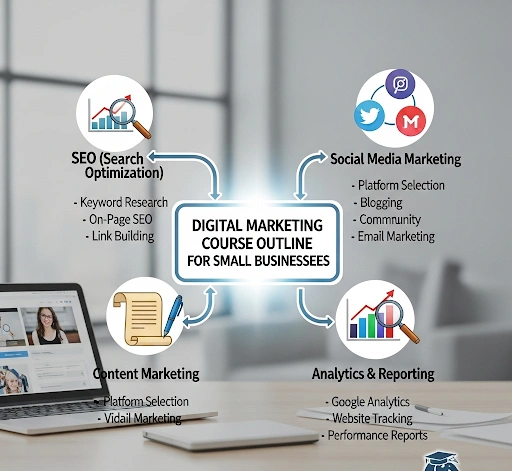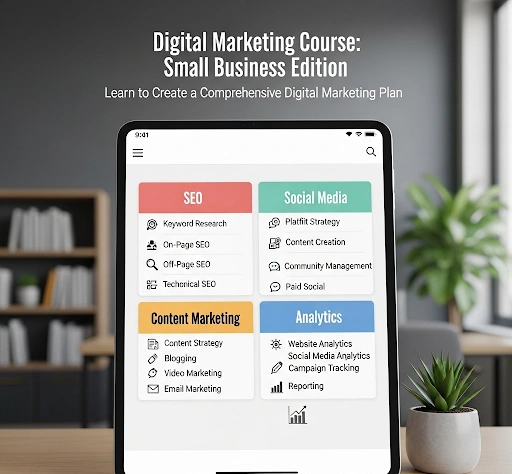In today’s competitive marketplace, a strong online presence is no longer optional for small businesses—it’s essential for survival and growth. While large corporations can invest heavily in dedicated marketing teams and extensive campaigns, small businesses often operate with limited budgets and resources. This makes a strategic and efficient approach to digital marketing paramount. Understanding the core components and developing a clear roadmap is crucial for success. This is where a well-structured digital marketing course outline small businesses can follow becomes an invaluable asset.
This comprehensive guide will present an ideal digital marketing course outline small businesses can use to navigate the complexities of online promotion. We’ll explore key modules, from foundational strategy to practical execution in areas like SEO, social media, content marketing, and paid advertising. Our aim is to help small business owners and aspiring marketers learn digital marketing plan creation, implement effective strategies, and achieve measurable growth in the digital realm.
- What is a Digital Marketing Course Outline and How It Helps Small Businesses?
- Why a Digital Marketing Course Outline Matters for Small Businesses
- Ideal Digital Marketing Course Outline Small Businesses Can Follow: Key Modules
- Real-Life Use Case: A Local Bakery’s Digital Marketing Journey
- Comparison: DIY Digital Marketing vs. Hiring an Agency for Small Businesses
- Common Mistakes Small Businesses Make in Digital Marketing
- Expert Tips and Best Practices for Digital Marketing Success
- FAQ Section
- Q: What is the most important module in a digital marketing course outline small businesses should focus on?
- Q: Can a small business afford digital marketing?
- Q: How long does it take to see results from digital marketing?
- Q: Do I need a website for digital marketing?
- Q: What is Local SEO?
- Q: Can I really learn digital marketing plan creation and execution myself?
- Q: How important is social media for small businesses?
- Conclusion
What is a Digital Marketing Course Outline and How It Helps Small Businesses?
A digital marketing course outline small businesses can use is a structured curriculum designed to teach the fundamental principles and practical skills required to effectively market a business online. Unlike general marketing courses, an outline tailored for small businesses focuses on actionable strategies that can be implemented with limited budgets and often by individuals with little prior marketing experience.
Such an outline typically covers various digital channels, tools, and metrics, emphasizing how each component contributes to a cohesive digital strategy. The goal is to empower small business owners to take control of their online presence, attract new customers, engage existing ones, and ultimately drive sales. In 2025, with increasing digital adoption, mastering these skills is more critical than ever for local and online small businesses.

Why a Digital Marketing Course Outline Matters for Small Businesses
For small businesses, a structured approach to learning digital marketing offers significant advantages that can directly impact their success.
Maximize Limited Resources
Small businesses often lack the budget for large marketing agencies or extensive in-house teams. A clear course outline helps owners and their small teams focus on the most impactful digital marketing activities, ensuring every dollar and hour spent yields the best possible return. It teaches them to prioritize and execute efficiently.
Stay Competitive in a Digital Landscape
Consumers increasingly discover and interact with businesses online. Without a strong digital presence, small businesses risk being invisible to potential customers. A comprehensive course outline equips them with the skills to compete effectively, reach wider audiences, and adapt to evolving online trends. This is crucial for any small business looking to learn digital marketing plan development.
Drive Measurable Growth
Digital marketing is highly measurable. A good course outline teaches how to track key performance indicators (KPIs), analyze data, and optimize campaigns for better results. This data-driven approach allows small businesses to understand what’s working, refine their strategies, and demonstrate a clear return on investment. For more general small business growth strategies, check out our guide on Small Business Growth Strategies.
Build Brand Awareness and Trust
Effective digital marketing isn’t just about sales; it’s about building a recognizable and trusted brand. A course outline covers strategies for consistent brand messaging across channels, engaging with customers online, and managing online reputation, all of which contribute to long-term brand equity.
Ideal Digital Marketing Course Outline Small Businesses Can Follow: Key Modules
A robust digital marketing course outline small businesses can implement should cover these essential modules, providing both theoretical knowledge and practical skills:
Module 1: Digital Marketing Fundamentals & Strategy
- **Introduction to Digital Marketing:** Overview of digital channels, benefits for small businesses.
- **Defining Your Target Audience:** Buyer personas, market research, understanding customer needs.
- **Setting Goals & KPIs:** SMART goals, key metrics for digital campaigns.
- **Developing a Digital Marketing Plan:** Crafting a comprehensive strategy, budget allocation, competitive analysis. This is where you truly learn digital marketing plan creation.
- **Website Essentials:** User experience (UX), mobile-friendliness, basic website analytics.
Module 2: Search Engine Optimization (SEO) for Small Businesses
- **SEO Basics:** How search engines work, importance for visibility.
- **Keyword Research:** Identifying relevant keywords for your niche.
- **On-Page SEO:** Optimizing website content, meta tags, images.
- **Local SEO:** Google My Business optimization, local citations, reviews.
- **Technical SEO Fundamentals:** Site speed, mobile optimization, crawlability.
Module 3: Social Media Marketing
- **Platform Selection:** Choosing the right social media channels for your audience.
- **Content Strategy:** Creating engaging posts, visuals, and video.
- **Community Management:** Engaging with followers, responding to comments.
- **Social Media Advertising Basics:** Setting up simple ad campaigns (e.g., Facebook Ads, Instagram Ads).
- **Measuring Social Media Performance:** Key metrics and analytics.
Module 4: Content Marketing & Email Marketing
- **Content Strategy:** Planning, creating, and distributing valuable content (blogs, videos, infographics).
- **Blogging for Business:** Setting up a blog, writing engaging articles.
- **Email Marketing Fundamentals:** Building an email list, crafting effective newsletters, automation.
- **Lead Nurturing:** Using email to guide prospects through the sales funnel.
Module 5: Paid Advertising (PPC)
- **PPC Basics:** Google Ads, social media ads, retargeting.
- **Campaign Setup:** Keyword bidding, ad copy, landing page optimization.
- **Budget Management:** Setting and optimizing ad spend.
- **Performance Tracking:** Measuring ROI, A/B testing ads.
Module 6: Analytics & Reporting
- **Google Analytics Basics:** Setting up GA4, understanding key reports.
- **Tracking Conversions:** Measuring leads, sales, and other goals.
- **Creating Dashboards:** Visualizing performance data for easy understanding.
- **Reporting & Optimization:** Using data to refine your digital marketing plan.

Real-Life Use Case: A Local Bakery’s Digital Marketing Journey
Consider “The Daily Crumb,” a small independent bakery in a bustling neighborhood. They had a great product but struggled to reach new customers beyond word-of-mouth. The owner, Maria, decided to follow a digital marketing course outline small businesses could use to boost her online presence.
**Maria’s Digital Marketing Journey:**
- **Strategy:** Maria first defined her target audience (local residents, office workers) and set clear goals (increase online orders by 20%). She learned to learn digital marketing plan essentials.
- **Local SEO:** She optimized her Google My Business profile, encouraging customers to leave reviews. This significantly improved her visibility in local search results.
- **Social Media:** She started posting daily on Instagram, showcasing beautiful photos of her baked goods, running polls for new flavor ideas, and engaging with local influencers.
- **Email Marketing:** She set up a simple email signup on her website, offering a discount for new subscribers. She sent weekly newsletters with specials and baking tips.
- **Paid Ads:** Maria ran small, targeted Facebook and Instagram ad campaigns promoting seasonal items to residents within a 5-mile radius, seeing a direct increase in foot traffic and online orders.
- **Analytics:** She regularly checked Google Analytics to see where her website traffic was coming from and which products were most popular online.
Within six months, The Daily Crumb saw a 30% increase in online orders and a noticeable rise in new customers visiting the bakery. This success was a direct result of Maria systematically applying the knowledge gained from a structured digital marketing course outline small businesses can leverage.
Comparison: DIY Digital Marketing vs. Hiring an Agency for Small Businesses
Small businesses often face the dilemma of doing digital marketing themselves or outsourcing. A digital marketing course outline small businesses use can inform this decision:
| Aspect | DIY Digital Marketing (with Course Outline) | Hiring a Digital Marketing Agency |
|---|---|---|
| Cost | Lower (time investment, course fee). | Higher (agency fees, retainers). |
| Control & Learning | Full control, deep understanding of your own marketing. You Digital Marketing Course Outline creation. | Less direct control, reliance on agency expertise. |
| Time Commitment | Significant time required for learning and execution. | Minimal time required from business owner. |
| Expertise Level | Develops internal expertise over time. | Access to immediate, broad industry expertise. |
| Scalability | Limited by internal capacity. | Easily scalable with agency resources. |
For many small businesses, starting with a DIY approach guided by a solid digital marketing course outline small businesses can learn from is a cost-effective way to build foundational skills before potentially scaling with agency support.
Common Mistakes Small Businesses Make in Digital Marketing
Even with a clear course outline, pitfalls exist. Avoid these common errors:
- Lack of a Clear Strategy: Jumping into tactics (e.g., posting on social media) without a defined target audience, goals, or overall plan. You need to Digital Marketing Course Outline creation first.
- Ignoring Local SEO: For brick-and-mortar businesses, neglecting Google My Business and local citations means missing out on nearby customers.
- Inconsistent Content: Posting sporadically or without a consistent brand voice. Consistency builds audience and trust.
- Not Tracking Results: Running campaigns without monitoring KPIs or analyzing data. If you don’t measure, you can’t improve.
- Spreading Too Thin: Trying to be active on every digital channel. Focus on 1-2 channels where your target audience is most active and master them.
- Neglecting Website Optimization: Having a slow, non-mobile-friendly website undermines all other digital marketing efforts.
Expert Tips and Best Practices for Digital Marketing Success
To truly excel in digital marketing, small businesses should integrate these expert tips into their strategy:
1. Start with a Solid Digital Marketing Plan
Before executing any tactics, invest time in creating a comprehensive digital marketing plan. Define your audience, set clear, measurable goals, identify your unique selling proposition, and map out your customer journey. This foundational step, learned from a good digital marketing course outline small businesses use, will guide all your efforts. The U.S. Small Business Administration provides excellent resources on how to market your business.
2. Prioritize Local SEO for Brick-and-Mortar
For local businesses, optimizing your Google My Business profile, collecting customer reviews, and ensuring consistent local citations across online directories are paramount. This ensures you appear in “near me” searches and drive local foot traffic. This is a crucial module in any effective digital marketing course outline small businesses should follow.
3. Focus on High-Quality, Value-Driven Content
Create content that genuinely solves your audience’s problems, answers their questions, or entertains them. Quality content builds authority, attracts organic traffic, and fosters trust. Whether it’s blog posts, videos, or social media updates, always aim to provide value.
4. Embrace Analytics and Iterative Optimization
Digital marketing is a continuous cycle of “test, measure, learn, optimize.” Regularly review your Google Analytics data, social media insights, and ad campaign performance. Use these insights to refine your strategies, reallocate budgets, and improve results. This data-driven approach is how you truly Digital Marketing Course Outline optimization.
5. Build an Email List from Day One
Email remains one of the most effective digital marketing channels for small businesses. Start collecting email addresses early (e.g., via website pop-ups, in-store sign-ups) and nurture your list with valuable content and exclusive offers. This direct communication channel builds strong customer relationships.

FAQ Section
Q: What is the most important module in a digital marketing course outline small businesses should focus on?
A: While all modules are important, the “Digital Marketing Fundamentals & Strategy” module is arguably the most crucial. Without a clear strategy and defined goals, efforts in other areas may be wasted. Learning to Digital Marketing Course Outline creation is foundational.
Q: Can a small business afford digital marketing?
A: Absolutely! Digital marketing can be highly cost-effective. Many strategies (like local SEO, organic social media, content marketing) can be implemented with minimal financial investment, relying more on time and effort. Paid advertising can be scaled to fit any budget. A good digital marketing course outline small businesses use helps optimize spending.
Q: How long does it take to see results from digital marketing?
A: It varies by strategy. Paid ads can yield immediate results. SEO and content marketing build momentum over months (3-6+ months). Social media engagement is ongoing. Consistency is key, and a well-defined digital marketing course outline small businesses use helps manage expectations.
Q: Do I need a website for digital marketing?
A: While you can start with just a social media presence, a professional website is highly recommended. It serves as your central online hub, giving you full control over your brand message, customer data, and conversion funnels. It’s an essential component to effectively learn digital marketing plan execution.
Q: What is Local SEO?
A: Local SEO (Search Engine Optimization) is the practice of optimizing your online presence to attract more local customers. This includes optimizing your Google My Business profile, building local citations, and managing online reviews. It’s crucial for brick-and-mortar small businesses.
Q: Can I really learn digital marketing plan creation and execution myself?
A: Yes, absolutely! With a structured digital marketing course outline small businesses can follow, dedication, and consistent practice, small business owners can learn to create and execute effective digital marketing plans themselves. Many successful small businesses started this way. It requires time and effort, but the knowledge gained is invaluable.
Q: How important is social media for small businesses?
A: Very important. Social media allows small businesses to connect directly with customers, build community, showcase products/services, and drive traffic. It’s a powerful tool for brand awareness and customer engagement, making it a key part of any digital marketing course outline small businesses should consider.
Conclusion
For small businesses, mastering digital marketing is no longer a luxury but a necessity for sustainable growth. A well-structured digital marketing course outline small businesses can follow provides the essential roadmap to navigate the online landscape effectively. By focusing on foundational strategy, mastering key channels like SEO and social media, and committing to continuous learning and optimization, you can transform your online presence.
To continue your journey into cloud security, consider the in-depth resources from the Cloud Security Alliance (CSA), a leading authority on cloud best practices. For more hands-on guides, check out our other posts on building a secure digital toolkit.
